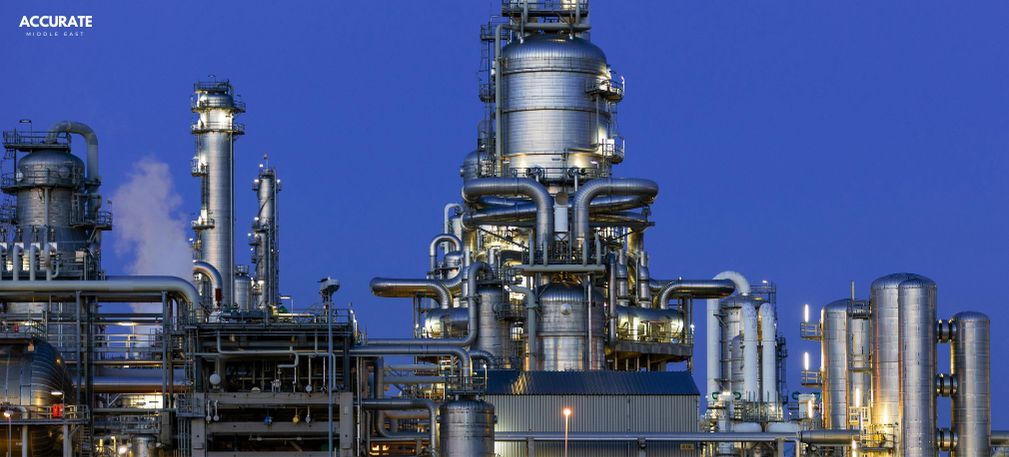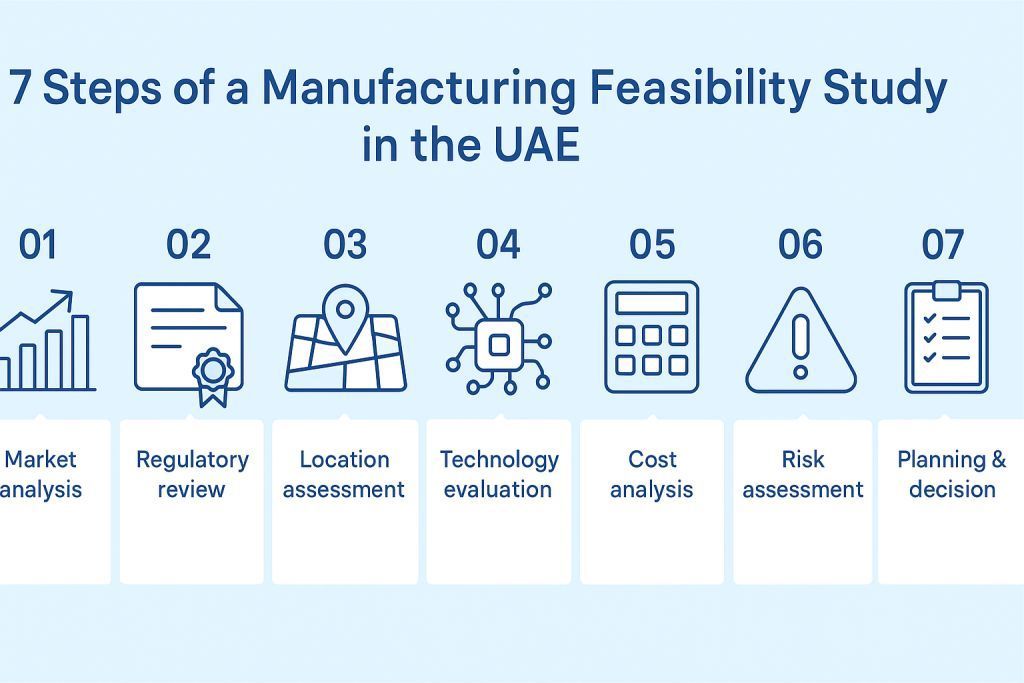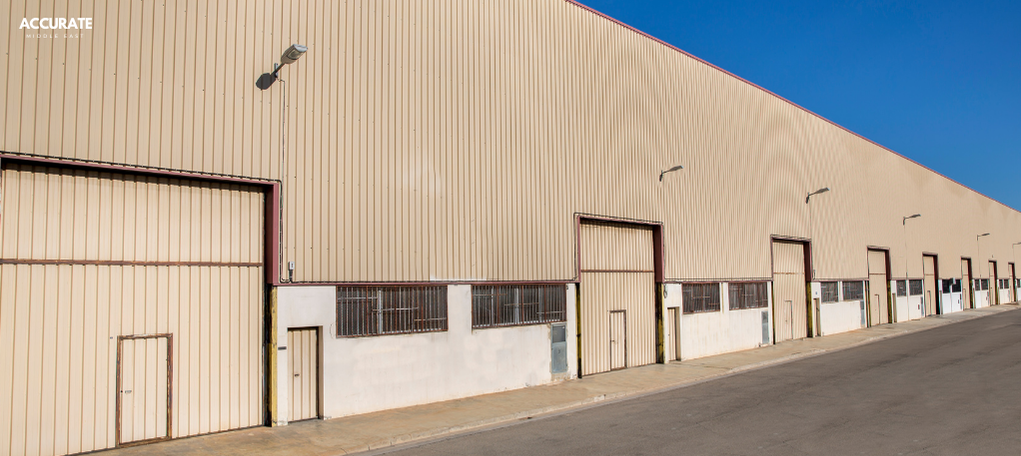Introduction: Why Manufacturing Feasibility Studies Are Essential in the UAE
The UAE is positioning itself as a global hub for advanced industries. With strategies like Operation 300bn and the “Make it in the Emirates” initiative, the government aims to increase the industrial sector’s contribution to GDP and attract international manufacturers to Dubai, Abu Dhabi, Sharjah, and other emirates.
But opportunity alone does not guarantee success. Manufacturing ventures require capital-intensive investments, regulatory compliance, and long-term planning. Many companies underestimate the complexity of establishing a factory in the UAE — from choosing the right location and license to evaluating operational costs and market demand.
This article offers a comprehensive market research and feasibility study guide for foreign investors, business owners, and corporate leaders considering industrial setup in the UAE. It explains why a feasibility study is essential, what steps it includes, how industrial zones compare, and how Accurate Middle East supports clients with research, analysis, and business planning to reduce risk and optimize growth.

UAE feasiblity Study Accurate
The Strategic Context: Why the UAE Attracts Manufacturers
The UAE every year attracts more and more businesses from various industries, including food processing, construction materials, pharmaceuticals, automotive, and renewable energy technologies. Several factors make it appealing:
- Strategic location linking Asia, Africa, and Europe.
- World-class infrastructure including ports, airports, and logistics corridors.
- Government incentives such as tax exemptions, 100% foreign ownership in free zones, and financing schemes through Emirates Development Bank.
- Vision-led initiatives like Dubai Industrial Strategy 2030 and Abu Dhabi’s KEZAD (Khalifa Economic Zones).
For investors, these policies create opportunities — but only if backed by clear data and feasibility analysis.

Feasibility Study for Manufacturing Setup in the UAE Accurate ME
Step-by-Step Framework: Feasibility Study for Manufacturing in the UAE
A manufacturing feasibility study in the UAE requires more than financial modeling; it must integrate regulatory, market, technical, and operational insights. Below is a structured approach Accurate Middle East applies when advising clients:
1. Define Objectives & Product Scope
- Clarify which products will be made and how they fit with the UAE’s industrial priorities, such as clean energy, materials, and food security.
- Define whether production targets local use, regional distribution, or export.
2. Regulatory & Licensing Scan
- Compare mainland and free zone setups. Free zones offer 100% ownership and simpler processes.
- Mainland entities provide better market access. Evaluate license categories, permits, and possible regulatory restrictions.
3. Market Analysis & Demand Forecasting
- Assess existing demand, market and competition.
- Examine import and export to understand substitution potential, such as replacing imported building materials with locally made ones.
- Identify distribution channels, including B2B supply, government contracts, or retail markets.
4. Infrastructure & Location Assessment
- Check available free zones in the UAE and setup options such as Dubai Industrial City, KEZAD, RAK, and Sharjah Airport FZ.
- Benchmark logistics, access, land/warehouse costs, and utility availability.
5. Investment & Cost Modeling
- Calculate capital expenditure: land, factory build-out, machinery, utilities.
- Model operating costs: labor, logistics, and raw material sourcing.
- Build financial scenarios with NPV, ROI, and payback projections.
6. Operational Feasibility
- Assess the availability of skilled and unskilled personnel.
- Evaluate the reliability of the supply chain and vendor networks.
- Analyze compliance requirements, including environmental standards and certifications.
7. Pilot Execution & Scalability
- Consider starting with a pilot facility or limited production line to test market acceptance.
- Plan phased expansion across UAE and GCC markets.
You can download a full manufacturing setup checklist for the UAE market from the website, buy pressing download PDF button.
Key Parameters to Assess in Manufacturing Feasibility
Every feasibility study in the Middle East looks at five key areas:
- Market Feasibility: Is there ongoing demand and a good competitive position for the product?
- Technical Feasibility: Are utilities, land, and equipment appropriate and cost-effective?
- Financial Feasibility: Can the project reach break-even and a positive return on investment within acceptable timelines?
- Regulatory Feasibility: Does the setup follow trade licenses and permits, ESG standards, and registration and certification rules?
- Operational Feasibility: Are the workforce, supply, warehousing, and vendor networks strong enough to support growth?
Industrial Zones in the UAE: Choosing the Right Base
The United Arab Emirates offers a range of free zones and industrial hubs. Selecting the right one depends on sector focus, logistics needs, and investment size.
The UAE offers a wide range of free zones and industrial hubs. Selecting the right one depends on sector focus, logistics needs, and investment size.
| Industrial Zone | Strengths | Ideal Sectors |
| Dubai Industrial City | Strong logistics, access to Jebel Ali Port | Food, construction, automotive |
| KEZAD (Abu Dhabi) | Large land availability, advanced infrastructure | Heavy industries, logistics, manufacturing clusters |
| RAK Free Trade Zone | Cost-effective land and labor | SMEs, light manufacturing, consumer goods |
| Sharjah Airport Free Zone (SAIF) | Proximity to airport, competitive costs | Electronics, FMCG, logistics |
A comparative feasibility analysis helps determine where the setup offers maximum strategic advantage.
Example Case: Food Processing Setup in Dubai Industrial City
Example Case: Food Processing Setup in Dubai Industrial City
A European food manufacturer contacted Accurate Middle East to assess whether Dubai would be the right place for its first Gulf processing facility. Our team carried out a detailed feasibility study, which included market research, financial modeling, and regulatory analysis. The study highlighted a strong opportunity. Demand for packaged food in the UAE was growing rapidly. A lot of this demand was still covered with imported products. Meanwhile the government was supporting food security initiatives to improve local production. Dubai Industrial City was notable for its logistical advantages and proximity to Jebel Ali Port.
Although land and transport costs were competitive, utility expenses needed a closer look and adjustments in the financial model to ensure profitability. With this insight, the company decided to proceed by launching a pilot production line. This move allowed it to test operations, distribution, and consumer response. Motivated by the results, the client is now getting ready to scale up, with plans to increase capacity within the next two years. This case shows how a well-executed feasibility study can turn a promising idea into a clear, actionable investment plan.
Example Case: GreenTech Manufacturing in Sharjah Free Zone
An international company that focuses on eco-friendly packaging hired Accurate Middle East to test the feasibility of producing sustainable materials locally in the UAE. The goal was to lower logistics costs from overseas manufacturing and to take advantage of the region’s increasing demand for environmentally friendly products.
Accurate Middle East conducted the research including consumer insights, competitor analysis, site assessments across Sharjah, Dubai, and Ras Al Khaimah. Sharjah’s Airport Free Zone (SAIF) stood out as the most cost-effective location. It offered lower land and labor costs while remaining close to both air and sea transport. The feasibility study pointed to a positive growth trend for GreenTech manufacturing but also showed the need to educate buyers about the benefits of sustainable packaging.
Based on the findings and further market entry recommendations and feasibility study, the client launched a pilot production facility and focused their marketing strategy on eco-safety and cost effectiveness. In the first year, the company secured partnerships with two major UAE supermarket chains and is now expanding operations to serve larger GCC markets.
Challenges and How to Overcome Them
Manufacturing in the UAE comes with challenges:
- Data gaps: Public data is limited, so primary research and industry-specific knowledge are necessary.
- Regulatory complexity: It can be confusing to navigate rules from multiple free zones and emirates.
- High initial costs: Land, equipment, and licensing need careful financial planning to prevent undercapitalization.
Accurate Middle East overcomes these challenges through on-the-ground research, regulatory expertise, and financial analysis — ensuring that clients avoid costly missteps.

Manufacturing Feasibility study UAE KSA
Future Outlook: Manufacturing in the UAE Beyond 2025
The UAE is investing heavily in:
- GreenTech and renewable energy manufacturing.
- Smart city infrastructure requires advanced materials and IoT-enabled systems.
- Healthcare and pharmaceuticals to strengthen local supply chains.
Foreign investors who enter now with a well-structured feasibility study position themselves to benefit from these growth trajectories.
Why Partner with Accurate Middle East
Setting up a manufacturing venture in the UAE is a strategic opportunity — but also a high-stakes challenge. Without a comprehensive feasibility study, investors risk misjudging market demand, underestimating costs, or choosing the wrong industrial zone.
Accurate Middle East helps clients transform data into clarity, building market analysis, feasibility studies, and business plans that guide confident decision-making.
📞 Ready to evaluate your project?
- Connect with us on WhatsApp
- Call us directly in the UAE: +971 50 599 5603
- Prefer email? Fill in our brief form and receive a customized proposal within 24 hours.
Whether you need a sample feasibility study, a market entry plan, or a bankable business model, our team is ready to support your expansion into the UAE, Saudi Arabia, and across the GCC.



